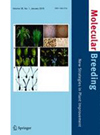Molecular Breeding is an international journal publishing papers on all aspects of research focused on applications of plant molecular biology i.e. research with results most likely leading to practical applications. The practical applications might relate to the Developing World as well as to the Western World and have demonstrable benefits for the seed industry farmers the processing industry the environment and the consumer. All papers published should contribute to the understanding and progress of modern plant breeding encompassing the scientific disciplines of biochemistry genetics physiology pathology plant breeding and ecology among others. Special emphasis is given to the molecular and cellular approaches to these disciplines. Molecular Breeding welcomes the following categories of papers: full research papers; short communications; papers describing novel methods; review papers and News and Views. All submissions will be subject to peer-review ensuring the highest possible scientific quality standards. Molecular Breeding Core Areas: 1. Agricultural Biotechnology: Tools & techniques:- Transformation technology; novel selectable markers; methods for stable transgene expression; methods for gene inactivation; methods for gene replacement; novel tools for gene mapping and isolation; Genes for novel products or traits:- Genes of agronomic/industrial/medical importance (e.g genes involved in disease/pest/stress resistance neutraceuticals); molecular 'pharming' (including metabolic pathway engineering production of vaccines antibodies novel food products a.o.); Marker assisted breeding:- Novel approaches and new results of marker assisted breeding approaches QTL cloning integration of conventional and marker assisted breeding are invited. This excludes e.g. : construction of detailed maps establishment of genetic relationships in crops and linkage analysis using standard technology. 2. Genomics: The use of functional and synthetic genomics epigenomics and proteomics (methods and achievements) relevant to agricultural biotechnology structure of plant genomes and plant chromosomes. 3. Field Testing: Expression stability of transgenes phenotypic and functional character biosafety issues ecological issues concerning genetically modified organisms. 4. Intellectual Property: Including patenting licensing and technology transfer.
